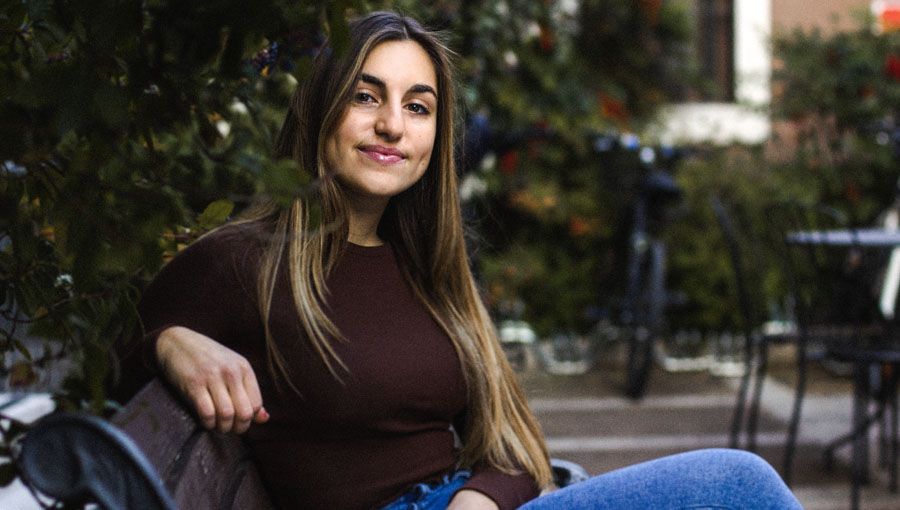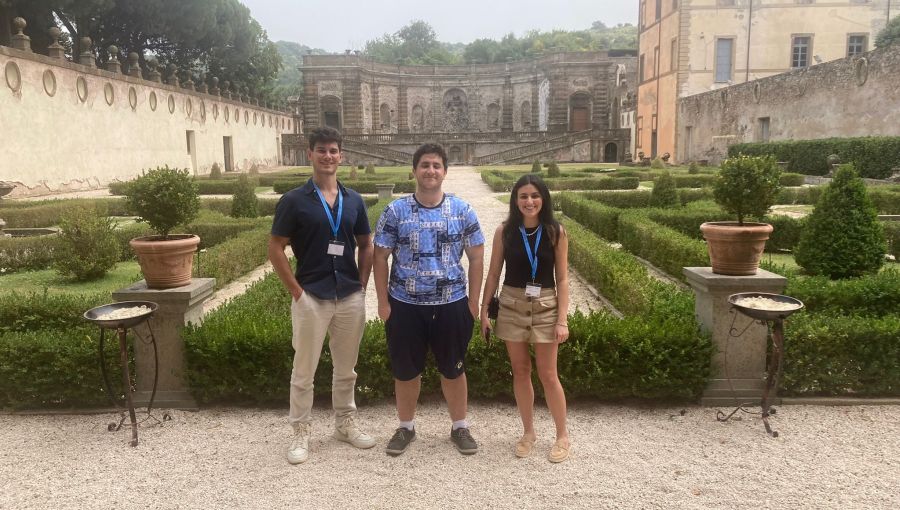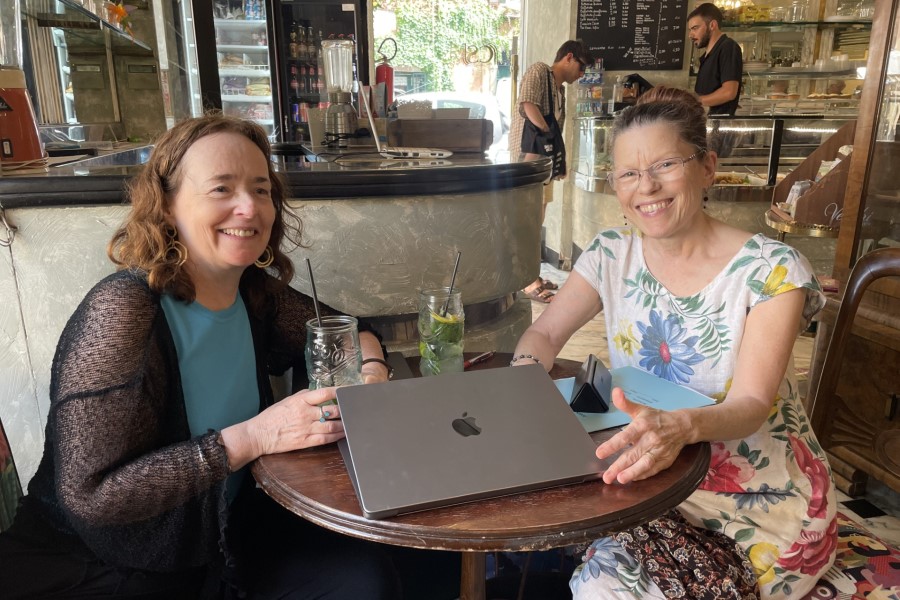Senior Maira Cardillo Attends Autumn School on Children in Armed Conflicts
Maira Cardillo is a senior from Naples, Italy, majoring in International Affairs with minors in Communications and Legal Studies. She is expected to graduate in May 2022. In October 2021, Maira attended the Autumn School on Children in Armed Conflicts, organized by the Institute of Political Studies “S. Pio V” and the Universities Network for Children in Armed Conflict.

Maira Cardillo
What brought you to JCU?
I’ve always been interested in international studies but was undecided about which path to pursue after high school. My dad had learned about JCU, an American university in Rome, so as soon as I completed my maturità, I rushed to Rome and applied to JCU. Today, I am very grateful to JCU for all the opportunities it has offered and that it keeps offering me.
You recently attended the Autumn School on Children in Armed Conflicts. What made you decide to apply? Tell us about your experience.
I attended the course, “Building competencies and awareness on the international protection of children, particularly girls, affected by armed conflict.” Professor Silvia Scarpa recommended the course as a unique experience for students, and I decided to apply because it was in line with my interest in human rights and humanitarian action.
The course was very intensive, Monday through Thursday from 2 to 6pm for two weeks. However, the effort was worth it! The Autumn School allowed me not only to learn about an issue that is highly underestimated in the international framework, but also to learn from and interact with experts in the field as well as students from all over the world. In particular, I enjoyed the group project carried out during the last two days of the course, which aimed at creating different like-minded groups to exchange ideas and propose recommendations on the issues discussed in the previous weeks. During the entire experience I felt part of a big network working towards concrete solutions to eliminate the problem of child soldiers. Also, now that the course is over, the Universities Network is continuing to involve us participants in its projects and keep us engaged in a very stimulating working group, organizing new activities, webinars, and training sessions.
Tell us about the paper you recently wrote on the universality of human rights and the situation of children in armed conflicts.
At the end of the course, each student had to write a paper on a topic of their choice, in keeping with the topics discussed. I decided to discuss the clash between human rights universalism and cultural relativism, analyzing the cultural aspect of child soldiers and trying to propose possible solutions on how to improve the issue of child recruitment during armed conflicts. To concretely demonstrate my point, I presented the case of Sierra Leone, which shows how the recruitment of children is a recurring and recognized tradition among the most vulnerable communities.
I started by arguing how human rights is a special and narrow category of legal guarantees one is entitled to for the sole fact of being human, regardless of the cultural and social context. But the fact that cultures differ among one another across time and space allows certain groups to justify the human rights violations they carry out as a matter of culture. Thus, in trying to explain the causal, twofold relationship between culture and child recruitment in armed conflict, the paper emphasizes the primary significance of the universality of human rights and of the role of education in creating a human rights culture that values life, freedom, and dignity above all, especially where children are concerned.
You’re majoring in International Affairs with minors in Legal Studies and Communications. What made you decide to combine these disciplines?
I decided to combine International Affairs and Legal Studies after noticing how many subjects and courses intertwined between the two areas of study. With this combination, I have been able to study the structure of different political systems across countries and to draw on International Relations theories for the study of war, peace, and conflict resolution in international politics, while at the same time incorporating theory with the reality of international law and the concrete validity of legal regulations. This has given me a complementary and multidisciplinary approach to real life politics and an exceptional preparation on a broad range of International Relations and legal topics.
Regarding the Communications minor, I thought it could complement my major because of the exponentially increasing digital media culture and its impact on society and politics. I have been able to analyze how much media can influence and shape perceptions of political life and, in turn, how politics exploit media to have an impact on society. I believe this combination has provided me with a unique interdisciplinary approach that has developed my critical, creative, and out-of-the-box thinking.
Are there any professors at JCU who have had an impact on you?
I’ve had many passionate professors who are experts in their fields, and are always very helpful, supportive, and kind, such as Professors Silvia Scarpa, Michael Driessen, Pamela Harris, Isabella Clough Marinaro, and Carolina De Luca. I am happy to say Professor Scarpa has been the one who has had the greatest impact on me. I enjoyed all her courses and would have taken them twice each time! I know the future path I want to follow thanks to her classes, which have helped me understand the area I am passionate about, and thanks to her experiences, which have helped me address the many doubts I had about my future academic and professional career. Also, Professor Scarpa has always provided me and other students with many opportunities, including the Autumn School’s intensive course and the internship I just started with the CoESPU center. I am very thankful to her for the extremely valuable advice she has given me and for her availability, patience, and time in supporting me with recommendation letters, meetings at Tiber Café to evaluate the different opportunities, etc.
You are currently doing a virtual internship at the Carabinieri-led Centre of Excellence for Stability Police Units (CoESPU) of Vicenza, Italy. What do your duties entail?
Recently, I have started working on a research activity in the area of “Cyberterrorism in the context of Cyber Peacekeeping.” We are beginning to analyze more specifically the new methods of terrorism and cyberterrorism financing, with a particular focus on the potential use of cryptocurrencies and on the recently formed operations of cyber peacekeeping as a countermeasure to the increasing issues of the cyber domain. The topic is relatively new among experts too, so I truly look forward to analyzing it more in depth with CoESPU. All activities are carried out together with a tutor, who is closely assisting me with his vast expertise in the drafting of the paper, which will then be published by CoESPU once the research is done.
Finally, thanks to the internship, I will have the possibility to participate in a one-week in-presence course in Vicenza on the topic of Child Protection at the end of May.
What are your plans for the future?
I am currently waiting to hear from a couple of universities to which I applied for my master’s degree. I would like to specialize in human rights and humanitarian action and further deepen my knowledge on the topics of conflict, peace, and security. My desire is to work directly in the field and to do everything in my power to assist those who need support in areas of vulnerability and conflict. Ideally, I wish to work for the UN or a specialized UN agency or perhaps to found my own NGO. Above all, I wish to do my part in the world and change it for the better.





